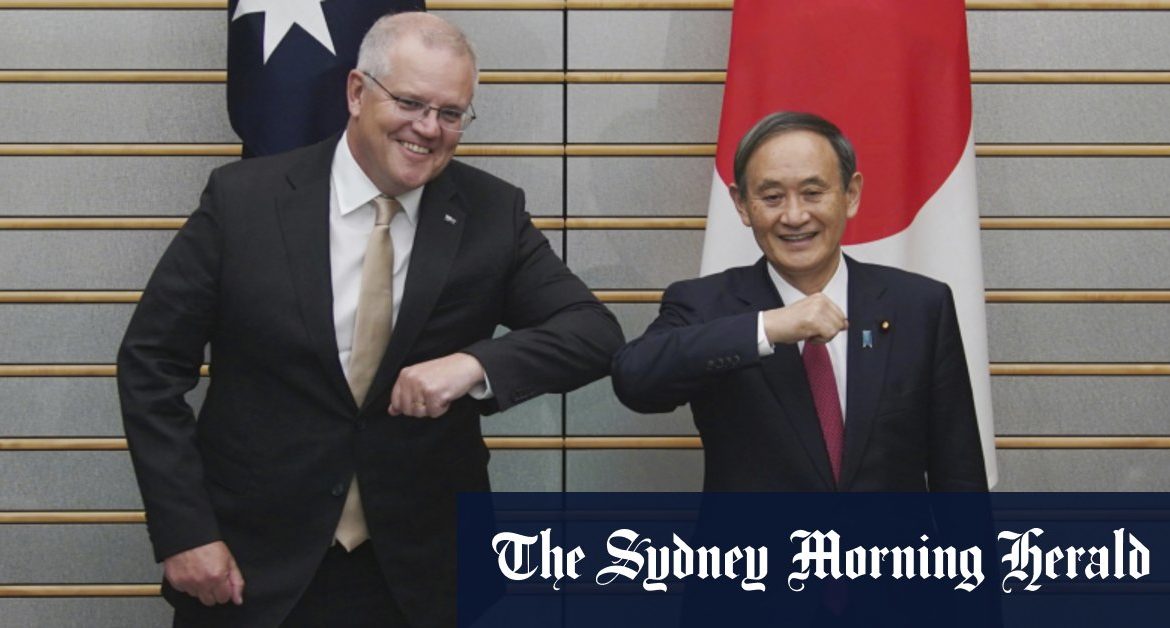“This agreement paves the way for a new chapter of advanced defence cooperation between our two countries,” he said.
Mr Morrison on Tuesday night became the first world leader to meet Mr Suga on Japanese soil since he became prime minister in September.
The two nations will now look to increase their military co-operation over the coming years in a number of key geo-strategic waterways, including in the South and East China seas.
China’s militarisation of the South China Sea and its incursion into Japanese territory in the East China Sea has been a growing concern for Australia and Japan.
It is the first agreement covering a foreign military presence in Japanese territory since the 1960 Status of Forces Agreement with the United States.
While Australia and Japan have been participating in military exercises together in recent years, the Reciprocal Access Agreement streamlines arrangements to support the deployment of troops more quickly and with less red tape.
Australian Prime Minister Scott Morrison poses with Japanese Prime Minister Yoshihide Suga at the start of their meeting at Suga’s official residence in Tokyo.Credit:AP
The in-principle agreement sets out the use of the other country’s defence bases, the cost and sharing of refuelling and munitions, claims for accidents and conduct during joint exercises.
The deal follows Australia’s return last month to the Malabar naval exercises involving Japan, India and the United States, in a move that unsettled Beijing.
Australia and Japan have been negotiating the RAA since 2014, but a key point of contention for negotiators was the possibility of ADF personnel facing the death penalty for crimes while serving in Japan.
Loading
The deal struck on Tuesday allows for the establishment of a mechanism “through which the international obligations of both sides are respected” suggesting Australian soldiers would not be exposed to the death penalty. More detail will be provided in the final wording of the agreement, which will be finished next year.
Mr Morrison was expected to invite Mr Suga to Australia next year to formally sign the final treaty, which will be followed by more detailed legal negotiations.
Mr Morrison said Australia and Japan were committed to working together in support of “a free, open, inclusive and stable Indo-Pacific”.
“It means Australia and Japan will have a clear framework for how our defence forces operate in each other’s countries” he said.
China’s Foreign Minister Wang Yi is expected to visit Tokyo less than a week after Mr Morrison leaves Japan.
Japanese newspapers Mainichi Shimbun and The Japan Times reported the visit was scheduled for November 25 and will be the highest level meeting between the two countries since Mr Suga took office in September.
China’s Foreign Ministry spokesman Zhao Lijian did not deny plans for the visit on Monday night. “Japan is China’s close neighbour,” he said. “We keep close bilateral exchange at all levels.”
The two major Asian powers have maintained bilateral contact despite the rising unease from countries throughout the region with Beijing’s growing assertiveness.
Japanese Foreign Minister Toshimitsu Motegi said on Monday that Japan was opposed to any Chinese efforts to “unilaterally change the status quo” by force in the East and South China Sea.
Loading
In his first phone call with Mr Suga on Thursday, US President-elect Joe Biden said the Japan-US Security treaty, obliging the US to defend Japan if it is attacked, would apply to the disputed Senkaku Islands in the East China Sea.
Beijing claims the islands off the coast of Taiwan as its own and has ramped up Chinese coast guard missions around the rocky outcrops since the beginning of this year.
Japan’s strategic escalation follows years of mounting concerns that its self-defence focussed military may be vulnerable to pressure from China’s expanding naval capability.
Anthony is foreign affairs and national security correspondent for The Sydney Morning Herald and The Age.
Eryk Bagshaw is the China correspondent for The Sydney Morning Herald and The Age. Due to travel restrictions, he is currently based in Canberra.
Most Viewed in Politics
Loading







